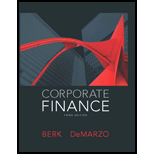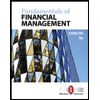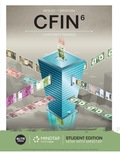
Corporate Finance
3rd Edition
ISBN: 9780132992473
Author: Jonathan Berk, Peter DeMarzo
Publisher: Prentice Hall
expand_more
expand_more
format_list_bulleted
Concept explainers
Question
Chapter 10, Problem 5P
a)
Summary Introduction
To determine: Whether there is a difference in
Introduction:
Capital yield refers to the change in the value of investment stated in terms of percentage.
b)
Summary Introduction
To determine: Whether there is a difference in dividend yield when the stock price falls and its reason.
Introduction:
Dividend yield refers to the percentage of the initial price of the share received as a dividend.
Expert Solution & Answer
Want to see the full answer?
Check out a sample textbook solution
Students have asked these similar questions
image is blurr please comment i will write values then solve.Please don't solve i mistakely posted blurr image.
i will give unhelpful if answer is incorrect..
image is blurr please comment i will write values then solve.Please don't solve i mistakely posted blurr image.
i will give unhelpful if answer is incorrect..
You are thinking of inving in Tikki's
Torches, Inc. You have only the following
information on the at year-end 2008:
Net income0.000
Total debt
12.2 million
Debt ratio 42%
What is Tikki's ROE for 2008?
a. 1.79%
b. 10.14%
c. 3.09%
d. 4.26%
Chapter 10 Solutions
Corporate Finance
Ch. 10.1 - Prob. 1CCCh. 10.1 - Prob. 2CCCh. 10.2 - Prob. 1CCCh. 10.2 - Prob. 2CCCh. 10.3 - How do we estimate the average annual return of an...Ch. 10.3 - Prob. 2CCCh. 10.4 - Prob. 1CCCh. 10.4 - Do expected returns of well-diversified large...Ch. 10.4 - Do expected returns for Individual stocks appear...Ch. 10.5 - What is the difference between common risk and...
Ch. 10.5 - Prob. 2CCCh. 10.6 - Explain why the risk premium of diversifiable risk...Ch. 10.6 - Why is the risk premium of a security determined...Ch. 10.7 - What is the market portfolio?Ch. 10.7 - Define the beta of a security.Ch. 10.8 - Prob. 1CCCh. 10.8 - Prob. 2CCCh. 10 - Prob. 1PCh. 10 - Prob. 2PCh. 10 - Prob. 3PCh. 10 - Prob. 4PCh. 10 - Prob. 5PCh. 10 - Prob. 6PCh. 10 - The last four years of returns for a stock are as...Ch. 10 - Prob. 8PCh. 10 - Prob. 9PCh. 10 - Prob. 10PCh. 10 - Prob. 11PCh. 10 - How does the relationship between the average...Ch. 10 - Consider two local banks. Bank A has 100 loans...Ch. 10 - Prob. 21PCh. 10 - Prob. 22PCh. 10 - Consider an economy with two types of firms, S and...Ch. 10 - Prob. 24PCh. 10 - Explain why the risk premium of a stock does not...Ch. 10 - Prob. 26PCh. 10 - Prob. 27PCh. 10 - What is an efficient portfolio?Ch. 10 - What does the beta of a stock measure?Ch. 10 - Prob. 31PCh. 10 - Prob. 32PCh. 10 - Prob. 33PCh. 10 - Suppose the risk-free interest rate is 4%. a. i....Ch. 10 - Prob. 35PCh. 10 - Prob. 36PCh. 10 - Suppose the market risk premium is 6.5% and the...Ch. 10 - Prob. 38P
Knowledge Booster
Learn more about
Need a deep-dive on the concept behind this application? Look no further. Learn more about this topic, finance and related others by exploring similar questions and additional content below.Similar questions
- Crenshaw, Incorporated, is considering the purchase of a $367,000 computer with an economic life of five years. The computer will be fully depreciated over five years using the straight-line method. The market value of the computer will be $67,000 in five years. The computer will replace five office employees whose combined annual salaries are $112,000. The machine will also immediately lower the firm's required net working capital by $87,000. This amount of net working capital will need to be replaced once the machine is sold. The corporate tax rate is 22 percent. The appropriate discount rate is 15 percent. Calculate the NPV of this project. Note: Do not round intermediate calculations and round your answer to 2 decimal places, e.g., 32.16. NPV Answer is complete but not entirely correct. S 103,141.80arrow_forwardYour firm is contemplating the purchase of a new $610,000 computer-based order entry system. The system will be depreciated straight-line to zero over its five-year life. It will be worth $66,000 at the end of that time. You will save $240,000 before taxes per year in order processing costs, and you will be able to reduce working capital by $81,000 (this is a one-time reduction). If the tax rate is 21 percent, what is the IRR for this project? Note: Do not round intermediate calculations and enter your answer as a percent rounded to 2 decimal places, e.g., 32.16. IRR %arrow_forwardQUESTION 1 Examine the information provided below and answer the following question. (10 MARKS) The hockey stick model of start-up financing, illustrated by the diagram below, has received a lot of attention in the entrepreneurial finance literature (Cumming & Johan, 2013; Kaplan & Strömberg, 2014; Gompers & Lerner, 2020). The model is often used to describe the typical funding and growth trajectory of many startups. The model emphasizes three main stages, each of which reflects a different phase of growth, risk, and funding expectations. Entrepreneur, 3 F's Debt(banks & microfinance) Research Business angels/Angel Venture funds/Venture capitalists Merger, Acquisition Grants investors PO Public market Growth (revenue) Break even point Pide 1st round Expansion 2nd round 3rd round Research commercial idea Pre-seed Initial concept Seed Early Expansion Financial stage Late IPO Inception and prototype Figure 1. The hockey stick model of start-up financing (Lasrado & Lugmayr, 2013) REQUIRED:…arrow_forward
- critically discuss the hockey stick model of a start-up financing. In your response, explain the model and discibe its three main stages, highlighting the key characteristics of each stage in terms of growth, risk, and funding expectations.arrow_forwardSolve this problem please .arrow_forwardSolve this finance question.arrow_forward
arrow_back_ios
SEE MORE QUESTIONS
arrow_forward_ios
Recommended textbooks for you
 Managerial AccountingAccountingISBN:9781337912020Author:Carl Warren, Ph.d. Cma William B. TaylerPublisher:South-Western College Pub
Managerial AccountingAccountingISBN:9781337912020Author:Carl Warren, Ph.d. Cma William B. TaylerPublisher:South-Western College Pub Survey of Accounting (Accounting I)AccountingISBN:9781305961883Author:Carl WarrenPublisher:Cengage Learning
Survey of Accounting (Accounting I)AccountingISBN:9781305961883Author:Carl WarrenPublisher:Cengage Learning Fundamentals of Financial Management, Concise Edi...FinanceISBN:9781305635937Author:Eugene F. Brigham, Joel F. HoustonPublisher:Cengage Learning
Fundamentals of Financial Management, Concise Edi...FinanceISBN:9781305635937Author:Eugene F. Brigham, Joel F. HoustonPublisher:Cengage Learning Intermediate Financial Management (MindTap Course...FinanceISBN:9781337395083Author:Eugene F. Brigham, Phillip R. DavesPublisher:Cengage Learning
Intermediate Financial Management (MindTap Course...FinanceISBN:9781337395083Author:Eugene F. Brigham, Phillip R. DavesPublisher:Cengage Learning
 Cornerstones of Financial AccountingAccountingISBN:9781337690881Author:Jay Rich, Jeff JonesPublisher:Cengage Learning
Cornerstones of Financial AccountingAccountingISBN:9781337690881Author:Jay Rich, Jeff JonesPublisher:Cengage Learning

Managerial Accounting
Accounting
ISBN:9781337912020
Author:Carl Warren, Ph.d. Cma William B. Tayler
Publisher:South-Western College Pub

Survey of Accounting (Accounting I)
Accounting
ISBN:9781305961883
Author:Carl Warren
Publisher:Cengage Learning

Fundamentals of Financial Management, Concise Edi...
Finance
ISBN:9781305635937
Author:Eugene F. Brigham, Joel F. Houston
Publisher:Cengage Learning

Intermediate Financial Management (MindTap Course...
Finance
ISBN:9781337395083
Author:Eugene F. Brigham, Phillip R. Daves
Publisher:Cengage Learning


Cornerstones of Financial Accounting
Accounting
ISBN:9781337690881
Author:Jay Rich, Jeff Jones
Publisher:Cengage Learning